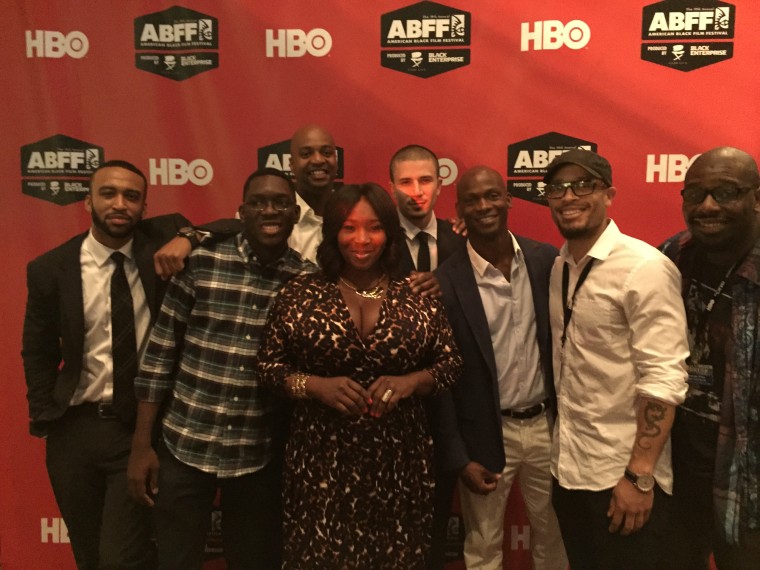Filmmaker Tony Patrick believes there is no better time than right now to be a black writer creating shorts. His film "Black Card," a satire about a couple under scrutiny from a shadow organization that regulates “blackness,” was selected in this year’s HBO Short Film competition.
The contest, hosted at the American Black Film Festival in New York City this weekend, inspired 182 filmmakers to apply for a chance at a $10,000 prize and distribution via HBO’s various media platforms. The distribution opportunity is extended to all of the finalists who choose to sign licensing agreements with HBO to air their short films. The exposure is a rare opportunity that could quickly catapult one’s career as it did for competition alumni like Ryan Coogler (“Fruitvale Station”) and Sylvain White (“Stomp the Yard”).
“Stanhope,” written and directed by Solvan Naim took home the grand prize, but Patrick would agree that this opportunity helps lower barriers to entry for filmmakers seeking to break into the mainstream Hollywood or independent film market.
“This is the perfect time for black creators or artists to do short films,” says Patrick. “Now there are platforms to put work out in matter of minutes. So instead of feeling barriers or obstacles erected that we face as artists of color we can use the internet to be seen.”
The opportunities now afforded to filmmakers of color through the advent of digital technology weren’t always available. Short films, an arguably grossly overlooked segment of the film industry, first attracted the attention of Michelle Materre, co-founder of the Creatively Speaking Film Series and Associate Professor of Media Studies and Film at the New School, around 19 years ago. The series became known for curating, packaging, and showcasing short films that Materre felt were being undervalued by the marketplace.
“At that time it was unusual to see a program of shorts. All these shorts were coming out of the African-American filmmaking community that had nowhere to go,” recalls Materre.
Since then many notable filmmakers have credited short films as helping to advance their careers from Malcolm D. Lee (“The Best Man”) to Shola Lynch (“Free Angela and All Political Prisoners”) to Dee Rees whose critically acclaimed feature-length film “Pariah” was based on a short.
In many ways they are indebted to pioneering filmmakers like William D. Foster. In 1912 he produced and directed the groundbreaking short film “The Railroad Porter” under his own enterprise, the Foster Photoplay Company. With the short film, Foster challenged Hollywood’s stereotypical depictions of black people and advocated for people of color to become stakeholders in the film marketplace.
“I think it shows and documents we do have a history in short films and a need for them still today. His legacy is prevalent as we still find an interest in shorts,” Materre says.
Similar to Foster the finalists of HBO’s competition are taking control by largely self-funding their own shorts and addressing subjects that Hollywood may otherwise shun. Solomon Onita, Jr. (“Joy”) stated covering 80% of his film’s $7,000 budget out-of-pocket with the remaining 20% raised through friends and family. Pete Chatmon, director of “Black Card” also self-funded his film, which he estimates was in the tens of thousands of dollars. But the investment is worth it for Chatmon who “finds more creative freedom with things funded by you.”
Indeed the shorts in competition do not hesitate to take artistic license in tackling controversial topics such as race and inner-city violence as found in “Chaining Day,” and female genital mutilation in “Joy.”
Still getting such films to a wider audience outside of festivals and industry players is of concern to champions of short films. Wilson Morales, editor of BlackFilm.com, is convinced that short films need more support from the media to truly have a fair chance of competing with feature-lengths and generating revenue.

“There’s promise if short films have the right venue, marketing, and backing. But it takes time and it is never easy,” he said. “We don’t promote it in the black community. Everybody wants what will sell. But the media needs to feature more emerging short filmmakers or create more visible platforms where those films can be seen.”
Dennis Williams, HBO’s vice-president of corporate social responsibility, is hopeful short form filmmakers of color will continue to progress. Williams specifically looks to a resurgence of interest in content by and about people of color as enough reason to continue supporting short films.
“I encourage people if they have an idea or concept to try your hand at short filmmaking and shop it around,” he advised. “I think filmmakers have to be brave regardless of what platform they are using. They were brave in the ‘70s with blaxploitation and ‘80s and ‘90s when there was a black renaissance in filmmaking. We are entering that era again now.”